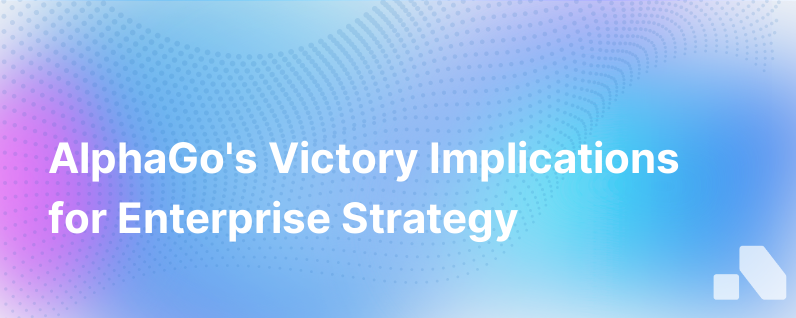
In March 2016, the world witnessed a significant milestone in the realm of artificial intelligence. AlphaGo, a computer program developed by Google DeepMind, triumphed over Lee Sedol, one of the highest-ranked Go players in the world. This victory marked not just an advancement in AI sophistication but signified a monumental shift in the approach to problem-solving in complex environments. The repercussions of such a technological advancement go beyond the game of Go and delve deep into the potential transformations within the enterprise sector.
AlphaGo and the Complexity of Go
Before delving into the enterprise implications, let's understand the complexity of AlphaGo's accomplishment. Go is an ancient board game of profound depth and strategic complexity. With more potential moves than the number of atoms in the universe, traditional brute-force computation methods, which had seen success in chess, could not conquer Go.
AlphaGo's approach was radically different. It used a combination of advanced machine learning techniques, including deep neural networks and reinforcement learning, to not only analyze vast amounts of data but also enable self-improvement by learning from each game it played. AlphaGo's win was metaphorical proof that AI could not only match but also surpass human abilities in dealing with highly intricate and nuanced tasks.
Paradigm Shift for the Enterprise
AlphaGo's triumph heralds a new era for enterprises, especially those who are grappling with complex decision-making processes within ever-changing environments. Here's what AlphaGo's historic win means for the enterprise.
Embracing AI-Powered Strategy and Decision Making
AlphaGo showed that machine learning could devise strategies that might not be intuitive to humans but are highly effective. For businesses, this translates into leveraging AI to optimize strategic business decisions ranging from financial planning to marketing approaches. As enterprises embrace AI and advanced analytics, the decision-making process can become more data-driven, cost-efficient, and ultimately more profitable.
Accelerated Innovation and Problem-Solving
AlphaGo's victory demonstrates the potential for AI to solve problems autonomously through a mix of learned experiences and calculated experimentation. Enterprises that empower their AI systems with the capability to learn and adapt will likely see advancements in innovation at speeds previously unattainable. This is particularly significant in areas like R&D, where the exploration of uncharted territories is vital.
Enhanced Data Analytics and Insights
The algorithms behind AlphaGo are exceptionally adept at parsing through and learning from vast data sets. When applied to enterprise-sized pools of data, AI could uncover insights that would remain hidden with conventional analysis. Enterprises armed with these insights could gain a competitive edge by anticipating market shifts, refining customer targeting, and tailoring personalized experiences.
Transforming Human and AI Collaboration
AlphaGo's success prompts a reassessment of how humans and AI collaborate. Rather than completely replacing human intelligence, AI can complement it. Enterprises can now look at creating hybrid human-AI teams where each can focus on their respective strengths. This could lead to enhanced productivity, creativity, and efficiency within the workforce.
Disruption Across Industries
While AlphaGo specifically addresses a board game, the technology's underlying principles find relevance across sectors. Industries rooted in complex decision-making such as healthcare, finance, logistics, and even creative industries could experience profound disruption. Enterprises in these sectors can deploy AI systems similar to AlphaGo to navigate intricate scenarios, whether it's in diagnosis, investment strategies, supply chain optimization, or design.
The Ethics and Governance of AI Systems
This significant step forward also brings to the fore discussions on AI ethics and governance. As enterprises integrate AI into core operational decisions, they must also consider the ethical implications attached to it. This moment in history accentuates the need for robust policies and frameworks to ensure responsible use of AI.
Scaling AI for Enterprise Challenges
AlphaGo's win accentuates the scalability of AI solutions. Businesses can scale AI applications to address a variety of their complex challenges, adjusting their scope and use cases as required. This flexibility positions AI as a cornerstone technology for companies looking to scale rapidly and effectively.
Educating the Future Workforce
Importantly, AlphaGo emphasizes the importance of AI literacy in the future workforce. Enterprises must invest in education and training programs to cultivate a talent pool skilled in AI and machine learning. This adds a new dimension to professional development programs within the business environment.
Conclusion
AlphaGo's historic win goes beyond the demonstration of AI's superiority in a board game; it reveals a future where AI's potential in the enterprise is boundaryless. It shows that sophisticated problem-solving, once the unique preserve of human intelligence, can now be augmented or even overtaken by machine learning technologies.
For enterprises, this means significant opportunities for growth, efficiency, and innovation. Those that move swiftly and thoughtfully to embrace intelligent automation stand to benefit the most, both in their internal processes and in their external offerings.
While we've seen what AI can achieve on the Go board, the real game - the enterprise landscape - poses even greater challenges and possibilities. The lessons from AlphaGo's win will undoubtedly lead the strategies for those willing to pioneer AI integration in their quest for progress and competitive edge.
In the post-AlphaGo era, the practical application of AI and machine learning in business strategy is not just a looming prospect—it is a present reality. Enterprises must see AlphaGo’s success as a blueprint, a source of lessons for their own journey towards digital transformation. As we reflect on this defining moment in AI, let us gear towards an innovative, collaborative, and thoughtfully governed AI-enhanced future.